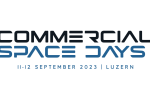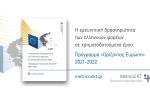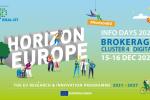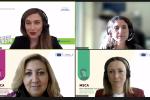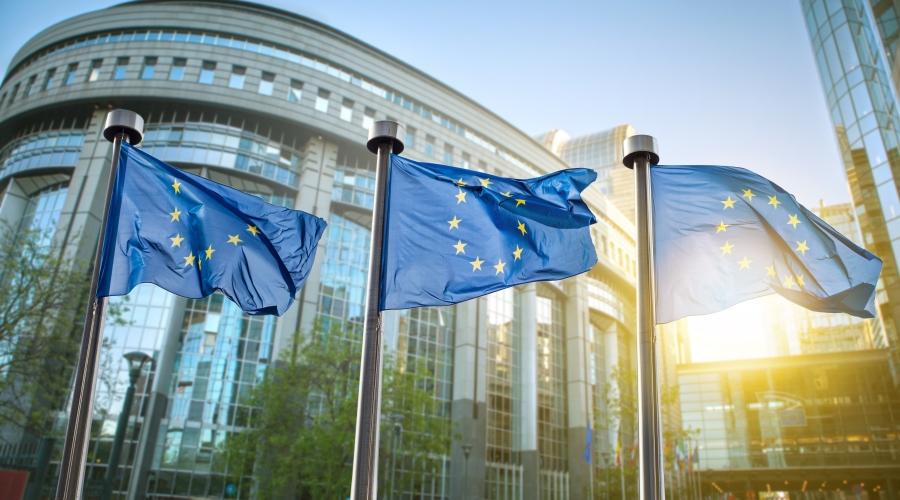
Greece has consistenly taken advantage of the opportunities offered by the EU Framework Programmes for Research and Innovation with remarkable performance that positions our country among the top performers of 27 member countries in a series of crucial indicators, such as the number of approved projects, the number of participations in projects and the amount of approved funding. During the period 2021-2022, Greece ranks 7th in Horizon Europe, as it accounted for 829 projects or 16.5% of all EU states' projects and for approved funding of 644.72 million euros, or 4.5% of all EU projects. In these projects, there are 505 unique Greek institutions involved, with a total of 1,716 participations.
These data are derived from the statistics and indicators of the new publication (in Greek) of the National Documentation Centre (EKT) ‘The research activity of Greek institutions in funded projects, Horizon Europe Programme, 2021-2022’ (https://metrics.ekt.gr/publications/651). Over the first two-year cycle of "Horizon Europe" (2021-2022), the approved projects involve businesses, Greek universities, research centres and other public bodies, as well as non-profit organisations. Participation comes from all 13 Regions, while the greatest number of participants and the greatest share of funding were found in the sectors of ‘Digital Technologies, Industry and Space’ and ‘Climate, Energy and Mobility’. Also noteworthy is the networking achieved by Greek organisations, creating collaborative links with organisations from 92 countries.
As noted by the Director of EKT, Dr. Evi Sachini, ‘The design of appropriate public policies, accompanied by effective funding mechanisms for their implementation, has become a key factor in promoting investment in the field of research and innovation. Greece belongs to the countries that have effectively utilized the funding opportunities provided by the European Framework Programs for Research & Innovation with notable results, supported by National Contact Points (including EKT). Given the increasing importance of direct public funding for research, EKT, as the National Statistical Authority, collects and provides data for the evaluation and monitoring of public financial interventions’.
With this publication, EKT introduces the new national statistics produced as the National Statistical Authority on the ‘research activity of Greek institutions in funded projects’ and analyses the participation of Greek institutions in Horizon Europe, with a focus on the first two years of implementation of the programme, 2021 and 2022. The data are extracted from the European electronic database eCORDA. It should be noted that since 2012, EKT has published special reports with detailed data on the performance of Greek institutions in the EU Framework Programmes for Research and Innovation, shedding light on important aspects of Greek research activity in order to draw useful conclusions for the effective targeting of public research policies.
The research activity of Greek institutions in Horizon Europe
The statistics of the new national statistics of EKT focus on the research activity of Greek institutions in funded projects, i.e. projects that have been positively evaluated and have proceeded to grant agreements. A key parameter of the publication is the number of approved projects in Horizon Europe in the period 2021-2022, where Greece ranks 7th among the EU27 countries with 829 approved projects (16.5% share of the total 5,019 approved projects). Leading the way are Germany, Spain, Italy, France, the Netherlands and Belgium. Additionally, in the ranking based on coordination role, which is an indirect indicator of excellence, recognition and the position of countries and institutions in research, Greece occupies eighth (8th) position among the EU27 countries (204 projects, 4.2% share).
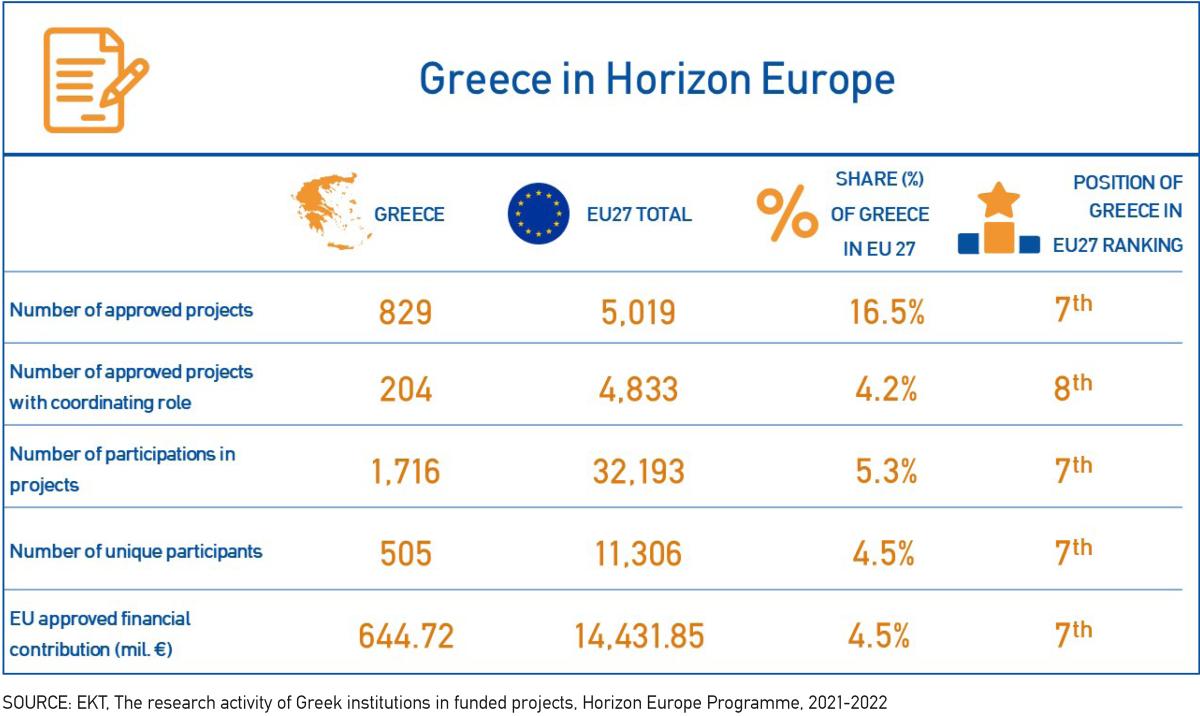
A second key dimension in the effort to capture the degree or ‘intensity’ of the research activity of the institutions of a country, is the number of participations. Greece’s share amounts to 1,716 participations (5.3%), occupying 7th place among the EU27 countries. The total of these participations translates into financing of EUR 644.72 million. This corresponds to 4.5% of the total funding received by entities from EU27 countries, with Greece again occupying 7th place.
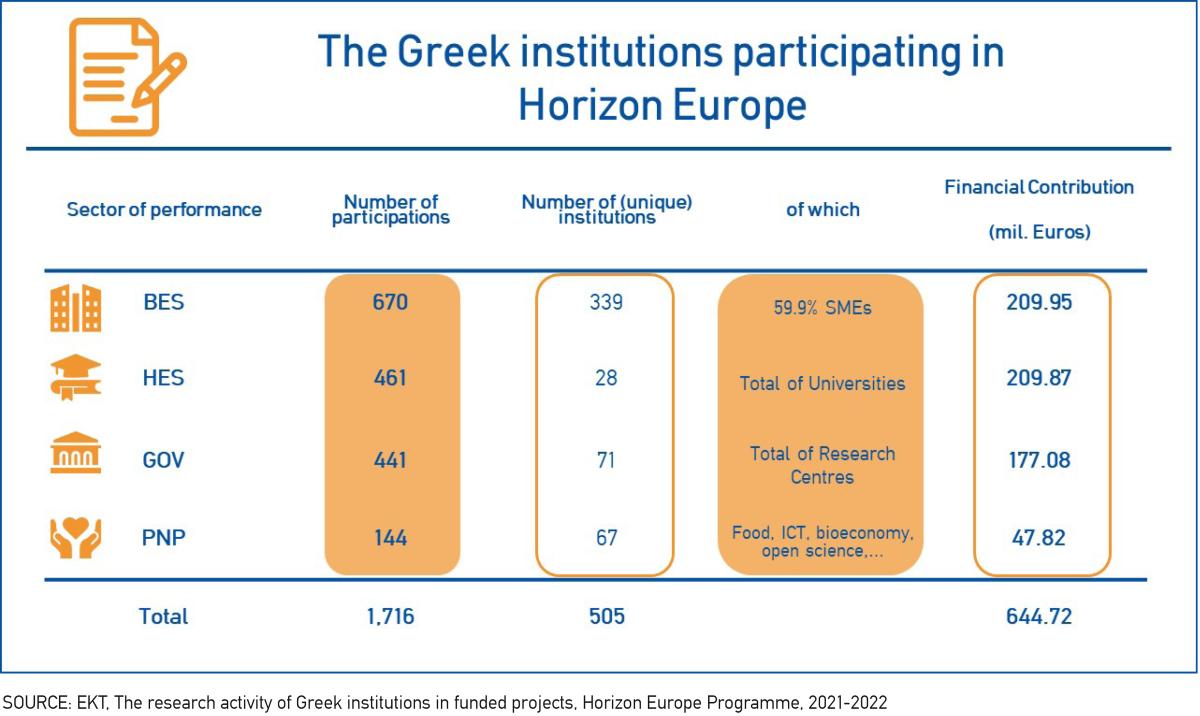
Regarding the main entities by sector of activity, in the enterprise sector (BES) there is a total funding of EUR 209.95 million. The three companies that have achieved the highest funding are WINGS ICT SOLUTIONS, UBITECH and TITAN. All the country's Universities and University Research Institutes participated in the field of higher education (HES), with an approved funding amount of € 209.87 million euro. In particular, the National Technical University of Athens and its affiliated Institute of Communication & Computer Systems ‘ICCS’ are in first place, followed by the Aristotle University of Thessaloniki and the University of Patras.
In the public sector (GOV), with a total approved funding of €177.08 million, the Centre for Research and Technology Hellas ranks first, followed by the Foundation for Research and Technology Hellas and Athena - Research Centre for Innovation in Information, Communication and Knowledge Technologies. Lastly, in the sector of private non-profit institutions (PNP), with a total funding of €47.82 million, the leading institutions are FOODSCALE, CORE Innovation Centre and INLECOM Innovation.
Thematic specialisation of Greek participation
It is worth noting that regarding thematic specialisation of the Greek participation, out of the 829 total approved projects, 75.4% (625 projects) belong to Pillar II ‘Global Challenges and European Industrial Competitiveness’ of Horizon Europe. This specific pillar is at the core of the programme, with the largest budget of EUR 53.5 billion, supporting projects aimed at creating new knowledge and developing new or improved technologies. It is structured into six thematic clusters of activities: ‘Health’, ‘Culture, Creativity and Inclusive Society’, ‘Civil Security for Society’, ‘Digital Technologies, Industry and Space’, ‘Climate, Energy and Mobility’ and ‘Food, Bioeconomy, Natural Resources, Agriculture and Environment’. Similarly, within Pillar I ‘Science of Excellence’, 14.4% (119) of projects with Greek participation are included. Finally, a smaller number of projects (23 projects, 2.8%) are covered by Pillar III ‘Innovative Europe’ and the Specific Objective ‘Widening Participation and Strengthening the European Research Area’ (62 projects, 7.5%).
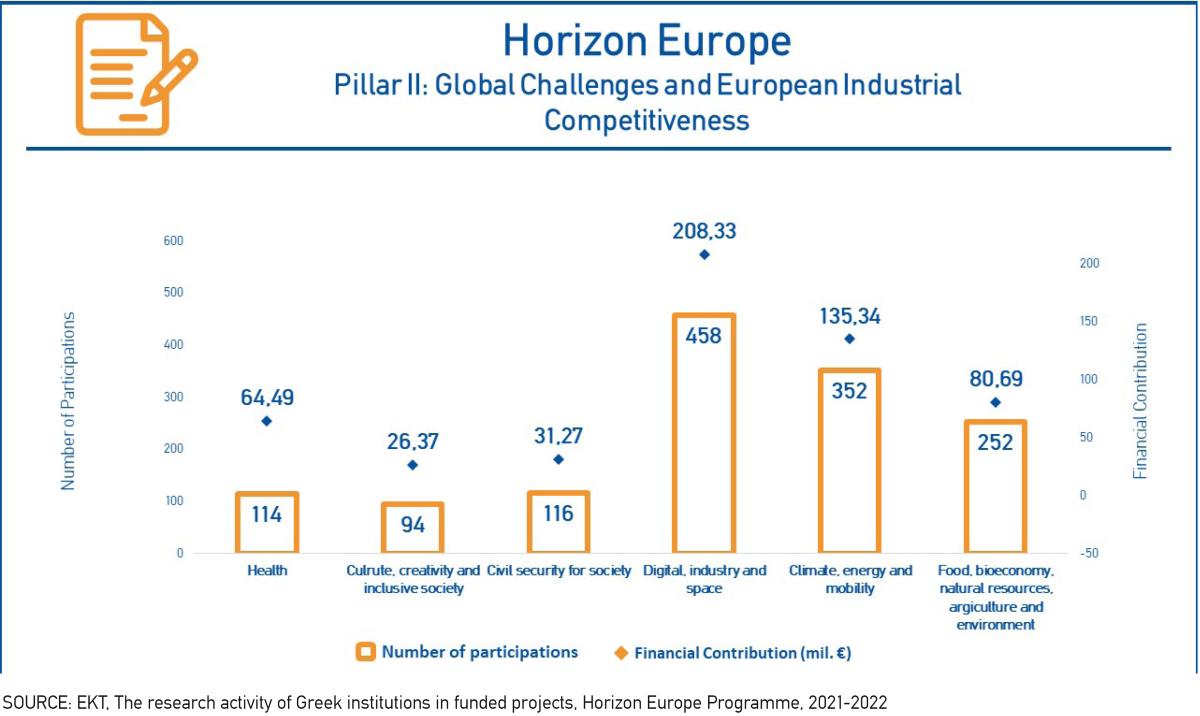
Further analysing Greek participation in Pillar II, the most numerous, in terms of the number of projects, participations and total amount of funding, is the cluster ‘Digital Technologies, Industry and Space’. This cluster includes 195 projects (23.5% of all projects with Greek participation), 458 participations (26.7% of total Greek participations) and funding of €208.33 million. This is followed by ‘Climate, Energy and Mobility’ with 161 projects (19.4% of all projects with Greek participation), 352 participations (20.5% of total Greek participations) and funding of €135.34 million. (21.0% of total Greek funding). As regards Greece's position, among the EU27 countries, based on the number of participations and EU funding (€ million) in Pillar II, in all clusters Greece occupies high positions and is among the top eight countries. The highest position (first) is recorded for the cluster ‘Civil Protection for Society’ (116 Greek participations, with funding of €31.27 million). Followed by ‘Digital Technologies, Industry and Space’, where Greece occupies fifth (5th) place in participations and sixth (6th) place in funding.
Collaboration networks - The participation of Greek Regions
Given the size and complexity of most Horizon Europe projects, the majority of them are implemented through collaborations. In this context, the degree of cooperation between Greek institutions and their counterparts abroad is of great interest. The 505 Greek institutions, participating in 829 projects, developed a total of 30,476 collaborations with institutions from 92 countries, with the highest percentage -as expected- belonging to countries of the European Union and the United Kingdom. Spain is the country whose institutions achieved the most collaborations with Greek research groups. Specifically, 3,644 collaborations (12.0% share) are carried out in all projects with Greek participation. It is followed by Italy (3,268 partnerships, 10.7%) and Germany (2,740 partnerships, 9%), followed by France and Belgium (2,156 and 1,689 partnerships, respectively).
Finally, the EKT publication thoroughly analyses and highlights the performance of the 13 Greek Regions based on the number of projects, participations and the resulting funding. The Attica Region gathers the majority of participations (1,009 participations, funding: €363.06 million), followed by Central Macedonia (320 participations, funding: €137.26 million) and Crete (151 participations, funding: €60.37 million).
EKT as National Contact Point for Horizon Europe
Horizon Europe is the ninth Framework Programme of the European Union for Research and Innovation, with a budget of €95.5 billion. for the period 2021 - 2027. It is the main EU programme aimed at linking research and innovation and its key priorities are tackling climate change, the digital transformation of society and the economy, citizens' well-being and security. The Programme facilitates cooperation and enhances the impact of research and innovation in the economy and society. It creates jobs, stimulates economic growth and promotes industrial competitiveness.
The National Documentation Centre (EKT) is the National Contact Point (NCP) for Horizon Europe, specifically for the Marie Skłodowska-Curie Actions (MSCA) programme under Pillar I and the thematic areas of ‘Health’ and ‘Digital, Industry and Space’, as well as for the Cancer Mission, under Pillar II.
Having a long-standing experience as National Contact Point since 1998 in the EU Framework Programmes for Research & Innovation, EKT supports organisations, businesses, academics and research institutions through an integrated network of services. It provides a comprehensive range of services, from identifying funding opportunities to proposal development and summission, project implementation and utilization of research results. Additionally, EKT records and analyses Greece's participation in European research and innovation programmes
Μάθετε Περισσότερα
- Publication ‘The research activity of Greek institutions in funded projects, Horizon Europe Programme, 2021-2022’
- metricsΕΚΤ - Research Activities - Greek Participation in European Projects
- ΕΚΤ Publications - Greek Participation in European Projects
- EKT - National Contact Point for the Horizon Europe Programme
- Horizon Europe










